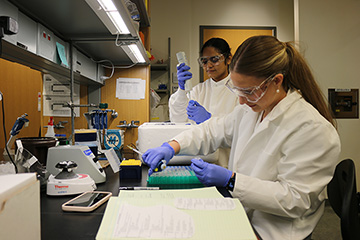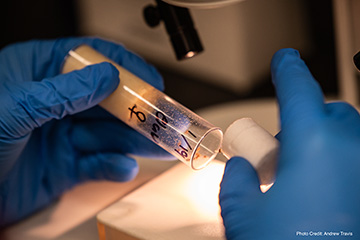CMU continues to lead in Great Lakes research
Students, faculty advance vital preservation efforts through $10M grant
Central Michigan University faculty and students will continue to lead vital Great Lakes wetlands research, thanks to a third $10 million grant awarded to by the U.S. Environmental Protection Agency.
Through the Great Lakes Coastal Wetland Monitoring Program funded through the Great Lakes Restoration Initiative, CMU will advance its important research on the health of plants, animals and water quality in approximately 1,000 Great Lakes coastal wetlands for another five years.
This funding follows a $10 million grant in 2010 and another $10 million grant in 2015.
"It's crucial that this wetlands research continue long-term," said Donald Uzarski, director of CMU's Institute for Great Lakes Research and the Biological Station on Beaver Island. "The goal in the first place was not only to measure the current conditions of these wetlands, but to look at trends over time, so we can be proactive rather than reactive."
Hundreds of government and environmental groups in the U.S. and Canada have requested data from the wetlands monitoring program, said Uzarski, leader of the wetlands program. They use the data to act appropriately, making decisions and enacting programs to protect and restore coastal wetlands.
The research includes taking water samples, examining fish and wildlife and covers more than 10,000 miles of shoreline in the U.S. and Canada, helping out: top scientists in wetland ecology, several other universities, and state and federal agencies.
Key work happens at CMU's Biological Station on Beaver Island, where student researchers spend summers on boats and in waders; testing water chemistry; and getting up close and personal with fish, birds and turtles.
"These data might tell us that one coastal wetland site has a huge invasive species issue," Uzarski said. "Another site might be one of the best that we have, and nobody should be doing any management there except protecting it."
The impact of coastal wetlands health is "big picture stuff," Uzarski said, from the huge economic impact that comes from these water systems being intact to ensuring quality drinking water.
Uzarski said many students also are fired up to join the research effort.
"Students who work on this project are very sought after for state and federal government job positions," he said. "Agencies are using these data, so they need people who understand it."
Setting the leadership standard
The ongoing EPA funding is a big boost for CMU, said David Weindorf, the university's vice president for research and innovation.
"The fact that the EPA continues to award CMU grants at this level reflects our cutting-edge research," Weindorf said. "We have people right here at CMU who continue to publish in the best scientific journals in the world. It sets us apart that we're in this unique position to do this work, with the Biological Station on Beaver Island and a strong network of partnering universities."
The wetlands research aligns with several of the United Nations' 17 sustainable development goals for the world, Weindorf said: "protecting life below water, and life on land, and ensuring clean water for all."
"We're doing that right here at CMU," Weindorf said. "When we continue to get big grants like this to work on important projects, it strengthens CMU's reputation as a university addressing issues of national importance. Here, big things are possible."




